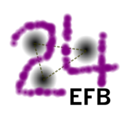Plenary sessions
- Constantia Alexandrou (University of Cyprus, Cyprus)
- “What have we learned on nucleon structure from Lattice QCD and future prospects?”
- Sonia Bacca (University of Mainz, Germany)
- “Nuclear structure corrections in light muonic atoms”
- Michael Birse (University of Manchester, UK)
- “Few-body physics: getting more effective”
- Mikhail Bashkanov (University of York, UK)
- “d*(2830) hexaquark: from Photoproduction to Neutron Stars”
- Cheng Chin (University of Chicago, USA)
- “Observation of Efimov states in ultracold atoms”
- Reinhard Dörner (Frankfurt University, Germany)
- “Giving a twist to Halo states: Helium Dimer and Trimer in Rotation”
- Shimpei Endo (Tohoku University, Japan)
- “Universal few-body clusters in cold atoms”
- Eduardo Garrido (IEM-CSIC, Madrid, Spain)
- "Weakly bound nuclei: A unified description of intrinsic and relative degrees of freedom".
- Daniel Gazda (Nuclear Physics Institute, Czech Republic)
- “Ab Initio Calculations of Light Hypernuclei”
- Rimantas Lazauskas (University of Strasbourg, France)
- “Solutions of the Faddeev-Yakubovsky equations for five-nucleon systems”
- Dean Lee (Michigan State University, USA)
- “Lattice simulations for nuclei, ultracold atoms, and ions”
- Miguel Marques (LPC Caen, France)
- “Exotic structures in exotic nuclei”
- Andreas Mathis (Technical University Munich, Germany)
- “Constraining Hyperon-Nucleon and Hyperon-Hyperon interactions with femtoscopy in ALICE”
- Angels Ramos (Barcelona University, Spain)
- “The molecular nature of some exotic hadrons”
- Olga Rubtsova (Moscow State University, Russia)
- “Dibaryon resonances and NN interaction”
- Takehiko Saito (RIKEN, Japan and GSI, Germany)
- “Few-body strangeness nuclei and their puzzles”
- “Few-body strangeness nuclei and their puzzles”
- Karin Schonning (Uppsala University, Sweden)
- “Hyperons - a strange key to the strong interaction”
- Kimiko Sekiguchi (Tohoku University, Japan)
- "Exploring Three-Nucleon Forces in Three- and Four-Nucleon Scattering"
- Simon Sirca (University of Ljubljana, Slovenia)
- "Study of light nuclei by polarization observables in electron scattering"
- Paul Sutcliffe (Durham University, UK)
- “Skyrmions and clustering in light nuclei”
- Jonathan Tennyson (Univeristy College London, UK)
- “Ultra cold chemistry using the R-matrix method”
- David Weiss (Pensylvania State University, USA)
- “ Energy-dependent 3-body loss in 1D Bose gases”
- Carl Wheldon (Birmingham University, UK)
- "Experiments and analyses aimed at understanding nuclear structure”
Parallel sessions
-
- "Description of continuum structures in a discrete basis: Three-body resonances and two-nucleon decays"
- Yong Chen (Purdue University)
- "Spin-orbit-coupled Bose-Einstein Condensate as playground to explore quantum collision and chemistry"
- Izabela Ciepał (H. Niewodniczanski Institute of Nuclear Physics PAS)
- "Few-Nucleon System Dynamics Studied via Deuteron-Deuteron Collisions at 160 MeV"
- Jacek Golak (M. Smoluchowski Institute of Physics, Jagiellonian University)
- "Investigations of the Few-Nucleon Systems within the LENPIC Project"
- Benjamin Gibson (Physical Review C)
- "Exploring the Unknown $\Lambda n$ Inteaction"
- Roman Kezerashvili
- "Three-body systems in novel two-dimensional materials"
- Douglas MacGregor (University of Glasgow)
- "Short-range nucleon correlations studied with electron and photon probes"
- Vladimir Melezhik (Joint Institute for Nuclear Research, Dunba, Russia)
- "Low-dimensional few-body collisional processes in atom-ion traps"
- Benedict Murdin (Univeristy of Surrey)
- "Donor impurities in silicon as a platform for few-body problems: donor excitation and donor-donor interactions"
- Jordi Mur-Petit (University of Oxford)
- "Revealing missing charges in few-body cold-atom systems with generalised quantum fluctuation relations"
- Eli Piasetzky (Tel Aviv University)
- "Study Nucleon-Nucleon Interaction with Short Range Correlation"
- Willibald Plessas (University os Graz)
- "Heavy-baryon speactrscopy"
- Michael Schulz (Missouri University of Science & Technology)
- "Fully Differential Study of Ionization of H2 by p Impact Near Velocity Matching"
- Magdalena Skurzok (INFN-LNF Frascati)
- Kaonic atoms experiments at the DAFNE collider
- Roberta Spartà (Università di Catania and INFN Laboratori Nazionali del Sud (Catania, Italy))
- "Few-body reactions investigated via the Trojan Horse Method"
- Alfred Stadler (University of Évora)
- "Mesons with charm and bottom quarks in a covariant quark model"
- Michele Viviani (INFN Pisa)
- "Electroweak processes in few-nucleon systems"
Special session: in menoriam of Roy Glauber
- Per Osland (University of Bergen)
- "Roy Glauber and asymptotic diffraction theory"
- Pierre Capel (Universität Mainz)
- "The eikonal model of reactions involving exotic nuclei; Roy Glauber's legacy in today’s nuclear physics"
Young Researcher Award session
- Robin Smith (Sheffield Hallam University)
- "The Hoyle Family: precision break-up measurements to explore nuclear α-condensates"
- Sebastian König (TU Darmstadt)
- "Few nucleons and other stories"
